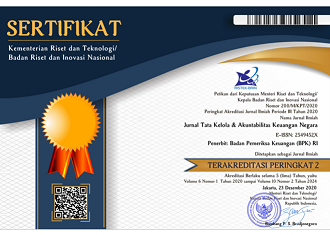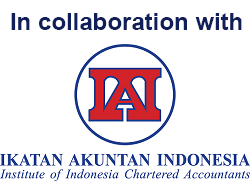Assessing the development of performance audit methodology in the supreme audit institution: The case of Indonesia
DOI:
https://doi.org/10.28986/jtaken.v7i1.554Keywords:
Audit reform, performance audit, effective, audit methodology, SAIAbstract
Badan Pemeriksa Keuangan (BPK), or The Audit Board of the Republic of Indonesia, has introduced performance audits intensively since public sector audit reforms were initiated in 2001. However, the implementation of performance audits still faces several obstacles. This study examines the development of the performance audit methodology in BPK, which can be divided into three stages: before the revitalization of BPK in 2006, the initial development of performance audits during 2006-2010, and the maturity of the implementation of performance audits since 2011. This study concludes that several key factors have affected the implementation of performance audits at BPK, including the development of audit guidelines, the dynamics of medium-term government planning, the focus of the BPK’s Management, and assistance provided by other supreme audit institutions (SAI). To address new realities and challenges in the future, more sophisticated performance audit methods need to be adopted by BPK, such as big data analytics, the adoption of governance audits, and employing public policy analysis. Without adopting such methods, the institutionalization of effective performance audits might not be achieved in the future.
References
Andrianto, N. (2007). Good e-government: Transparansi dan akuntabilitas publik melalui e-government. Malang: Bayumedia.
Andrianto, N. (2015). Pengembangan kapasitas pemeriksaan kinerja di BPK dan ANAO, sebuah kajian perbandingan. Jurnal Tata Kelola dan Akuntabilitas Keuangan Negara, 1(1), 43–65. DOI: 10.28986/jtaken.v1i1.21
BPK bantu SAI Vietnam kembangkan or- ganisasi. (2019, December). Warta Pemeriksa. p.30. https:// www.bpk.go.id/assets/files/ magazine/edisi-12-vol-ii-desember2019_edisi_12___vol__ii_desember _2019_1580118845.pdf
BPK berbagi ilmu di kancah internasional. (2019, May). Warta Pemeriksa. p.19. Retrieved from https:// www.bpk.go.id/assets/files/ magazine/edisi-5-vol-ii-mei2019_edisi_5 vol
ii_mei_2019_1566872934.pdf
BPK perbanyak pemeriksaan dengan format LFAR. (2021, February). Warta Pemeriksa. p.22. https:// www.bpk.go.id/assets/files/ magazine/edisi-2-vol-iv-februari2021_warta_pemeriksa_februari_20 21_1614578289.pdf
BPK RI. (2008). Performance audit guidance. Jakarta: BPK. BPK RI. (2011a). Performance audit guidance. Jakarta: BPK.
BPK RI. (2011b). Technical guideline in determining key area. Jakarta: BPK. BPK RI. (2011c). Technical guideline in developing audit criteria. Jakarta: BPK.
BPK RI. (2013). Seven years cooperation of BPK RI and ANAO, the development of public sector auditing. Jakarta: BPK.
BPK RI. (2015). Supplementary guideline in formulating audit conclusion. Jakarta: BPK.
BPK RI. (2016a). Technical guideline in developing performance audit report. Jakarta: BPK. BPK RI. (2016). IDI-ASOSAI 31st cooperative performance audit of disaster management. Jakarta: BPK.
BPK RI. (2018). Performance audit report of the preparedness for implementation of SDGs in Indonesia. Jakarta: BPK.
BPK RI. (2019). Supplementary guideline of performance audit design. Jakarta: BPK. BPK RI. (2020). Performance audit guidance. Jakarta: BPK.
BPK terpilih jadi pemeriksa eksternal IMO. (2019, December). Warta Pemeriksa. p.15. https://www.bpk.go.id/assets/ files/magazine/edisi-12-vol-iidesember2019_edisi_12___vol__ii_desember _2019_1580118845.pdf
Bringselius, L. (2010). Impact at any price: The National Audit Office (NAO) and the media. Paper presented at The International Research Society for Public Management (IRSPM), Berne, Switzerland. Retrieved from https:// portal.research.lu.se/portal/ files/6185772/1567074.pdf
Bringselius, L. (2018). Efficiency, economy and effectiveness—but what about ethics? Supreme audit institutions at a critical juncture. Public Money & Management, 38(2), 105–110. DOI: 10.1080/09540962.2018.1407137
Brinkerhoff, D. W., & Wetterberg, A. (2013). Performance-based public management reforms: experience and emerging lessons from service delivery improvement in Indonesia. International Review of Administrative Sciences, 79 (3), 433–457. DOI: 10.1177/0020852313491059
Desmedt, E., Morin, D., Pattyn, V., & Brans, M. (2017). Impact of performance audit on the administration: A Belgian study (2005-2010). Managerial Auditing Journal, 32(3), 251–275. DOI: 10.1108/MAJ-04-2016-1368
Everett, J. (2003). The politics of comprehensive auditing in fields of high outcome and cause uncertainty. Critical Perspectives on Accounting, 14(1), 77– 104. DOI: 10.1006/cpac.2001.0517
Grönlund, A., Svärdsten, F., & Öhman, P. (2011). Value for money and the rule of law: The (new) performance audit in Sweden. International Journal of Public Sector Management, 24(2), 107 –121. DOI: 10.1108/09513551111109026
INTOSAI. (2019). ISSAI 300: Performance audit principles. Retrieved from https://www.intosai.org/fileadmin/ downloads/documents/open_access/ ISSAI_100_to_400/issai_300/ ISSAI_300_en_2019.pdf
Irawan, A. B., & McIntyre-Mills, J. (2016). Application of critical systems thinking to performance auditing practice at the Indonesian Supreme Audit Institution: Issues and challenges. Systems Research and Behavioral Science, 33 (1), 24–44. DOI: 10.1002/sres.2325
Jefriando, M. (2015, August 20). BPK Laos ingin berguru ke RI. Detikfinance. Retrieved from https:// finance.detik.com/berita-ekonomibisnis/d-2997112/bpk-laos-inginberguru-ke-ri
Johnsen, Å., Reichborn-Kjennerud, K., Carrington, T., Jeppesen, K. K., Taro, K., Vakkuri, J. (2019). Supreme audit institutions in a high-impact context: A comparative analysis of performance audit in four Nordic countries. Financial Accountability & Management, 35(2), 158–181. DOI: 10.1111/ faam.12188
Lapsley, I., & Miller, P. (2019). Transforming the public sector: 1998–2018. Accounting, Auditing & Accountability Journal, 32(8), 2211–2252. DOI: 10.1108/AAAJ-06-2018-3511
Loke, C. H., Ismail, S., & Hamid, F. A. (2016). The perception of public sector auditors on performance audit in Malaysia: an exploratory study. Asian Review of Accounting, 24(1), 90– 104. DOI: 10.1108/ARA-12-20130082
Lonsdale, J. (2000). Developments in value for-money audit methods: Impacts and implications. International Review of Administrative Sciences, 66 (1), 73–89. DOI: 10.1177/0020852300661007
Lonsdale, J. (2011). The right tool for the job? Methods, choice and context. In J. Lonsdale, P. Wilkins, & T. Ling (Eds.). Performance Auditing: Contributing to Accountability in Democratic Government. Cheltenham, UK: Edward Elgar.
Manaf, A., & Athirah, N. (2010). The impact of performance audit: The New Zealand experience. (Unpublished master’s thesis). Victoria University of Wellington, New Zealand. Retrieved from http:// hdl.handle.net/10063/1376
Mir, M., & Sutiyono, W. (2013). Public sector financial management reform: A case study of local government agencies in Indonesia. Australasian Accounting, Business and Finance Journal, 7(4), 97–117.
Nath, N., Othman, R., & Laswad, F. (2020). External performance audit in New Zealand public health: A legitimacy perspective. Qualitative Research in Accounting & Management, 17(2), 145–175. DOI: 10.1108/QRAM-112017-0110
Nicoll, P. (2017). Creating Good and Clean Government: Performance Audit in
Indonesia. Retrieved from https:// www.amazon.com/CREATINGGOOD-CLEAN-GOVERNMENTPERFORMANCE-ebook/dp/ B06XTKFTTQ
Parker, L. D., Jacobs, K., & Schmitz, J. (2018). New public management and the rise of public sector performance audit. Accounting, Auditing & Accountability Journal, 32(1), 280– 306. DOI: 10.1108/AAAJ-06-20172964
Pierre, J., & de Fine Licht, J. (2019). How do supreme audit institutions manage their autonomy and impact? A comparative analysis. Journal of European Public Policy, 26(2), 226–245. DOI: 10.1080/13501763.2017.1408669
Pollitt, C. (2003). Performance audit in Western Europe: Trends and choices. Critical Perspectives on Accounting, 14(1), 157–170. DOI: 10.1006/ cpac.2002.0521
Pollitt, C., Girre, X., Lonsdale, J., Mul, R., Summa, H., & Waerness, M. (1999). Performance or compliance? Performance audit and public management in five countries.
Power, M. (2003). Evaluating the audit explosion. Law & Policy, 25(3), 185– 202. DOI: 10.1111/j.14679930.2003.00147.x
Pramono, A. J. (2016). Analisis faktor-faktor yang memengaruhi transformasi kapabilitas organisasi dan peran Badan Pemeriksa Keuangan RI. Jurnal Tata Kelola dan Akuntabilitas Keuangan Negara, 2(2), 175–193. DOI: 10.28986/jtaken.v2i2.63
Rai, I. G. A. (2008). Audit kinerja pada sektor publik: Konsep, praktik, studi kasus. Jakarta: Penerbit Salemba.
Raudla, R., Taro, K., Agu, C., & Douglas, J. W. (2016). The impact of performance audit on public sector organizations: The case of Estonia. Public Organization Review, 16(2), 217– 233. DOI: 10.1007/s11115-015-03080
Reichborn-Kjennerud, K. (2013). Political accountability and performance audit: The case of the Auditor General in Norway. Public Administration, 91 (3), 680–695. DOI: 10.1111/ padm.12025
Reichborn-Kjennerud, K., & Vabo, S. I. (2017). Performance audit as a contributor to change and improvement in public administration. Evaluation, 23(1), 6–23. DOI: 10.1177/1356389016683871
Torres, L., Yetano, A., & Pina, V. (2016). Are performance audits useful? A comparison of EU practices. Administration & Society, 51(3), 431–462. DOI: 10.1177/0095399716658500
Van Loocke, E., & Put, V. (2011). The impact of performance audits: A review of the existing evidence. Performance Auditing: Contributing to Accountability in Democratic Government, 175–208.
Downloads
Submitted
Accepted
Published
How to Cite
Issue
Section
License

Jurnal Tata Kelola dan Akuntabilitas Keuangan Negara is licensed under
a Creative Commons Attribution-ShareAlike 4.0 International License















